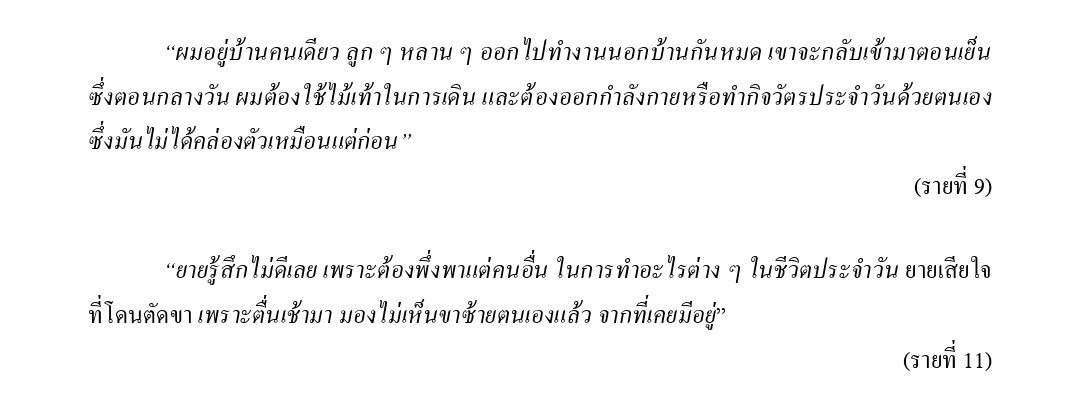ประสบการณ์การดูแลตนเองของผู้สูงอายุโรคเบาหวานภายหลังถูกตัดเท้าที่อาศัย อยู่ในเขตชนบท
คำสำคัญ:
ผู้สูงอายุ, โรคเบาหวาน, การดูแลตนเอง, ถูกตัดเท้าบทคัดย่อ
บทความวิจัยนี้มีวัตถุประสงค์เพื่อศึกษาประสบการณ์การดูแลตนเองของผู้สูงอายุโรคเบาหวานภายหลังถูกตัดเท้า โดยใช้ระเบียบวิธีวิจัยเชิงคุณภาพแบบปรากฏการณ์วิทยา (Phenomenological Research) ผู้ให้ข้อมูลเป็นผู้สูงอายุที่มีโรคเบาหวานที่ถูกตัดเท้าส่วนล่างที่อาศัยอยู่ในเขตชนบท อำเภอเมือง จังหวัดมหาสารคาม จำนวน 12 คน เก็บข้อมูลในช่วงเดือน กุมภาพันธ์ 2565 ถึงเดือน เมษายน 2565 เครื่องมือที่ใช้ในการวิจัย คือ แบบสัมภาษณ์เชิงลึก การสังเกต จดบันทึกภาคสนาม และการบันทึกเทป นำข้อมูลที่ได้มาถอดความแบบคำต่อคำ (Verbatim transcription) และทำการวิเคราะห์ข้อมูลการวิเคราะห์ข้อมูลโดยการวิเคราะห์เชิงใจความหลัก (Thematic analysis)
ผลการศึกษาพบว่า ผู้ให้ข้อมูลให้ความหมายของประสบการณ์การดูแลตนเองหลังจากที่โดนตัดเท้าจากโรคเบาหวาน ออกเป็น 3 ประเด็น คือ 1. ประสบการณ์ด้านจิตใจ ประกอบด้วย 2 ประเด็นย่อย ความรู้สึกการอยู่แบบอวัยวะไม่ครบ, การเป็นภาระของคนอื่น 2. ประสบการณ์ด้านร่างกาย ประกอบด้วย 2 ประเด็นย่อย การสูญเสียสมรรถนะในการทำงาน, ปรับเปลี่ยนหน้าที่ในครอบครัว3. การเผชิญกับความเครียดประกอบด้วย 3 ประเด็นย่อย การปลอบใจตนเอง, การถูกตัดเท้าเป็นผลจากกรรมในอดีต, ต้องพึ่งพาบุคคลอื่น ผลการศึกษาดังกล่าวนี้จะช่วยให้เกิดความเข้าใจเกี่ยวกับประสบการณ์ของผู้สูงอายุโรคเบาหวานภายหลังถูกตัดเท้า สามารถนำไปเป็นข้อมูลพื้นฐานเพื่อเตรียมความพร้อมการวางแผนดูแลตนเองของผู้ป่วยสูงอายุโรคเบาหวานหลังจากถูกตัดเท้า เพื่อให้มีการดูแลที่ถูกต้องต่อไป
เอกสารอ้างอิง
Fisher, L., Hessler, D., Polonsky, W., Strycker, L., Guzman, S., Bowyer, V., & Masharani, U. (2018). Emotion regulation contributes to the development of diabetes distress among adults with type 1 diabetes. Patient education and counseling, 101(1), 124-131. https://doi.org/10.1016/j.pec.2017.06.036
Health Data Center. (2021). KPI report NCD clinic plus: Percentage of controlled diabetes. https://hdcservice.moph.go.th/hdc/main/index.php
International Diabetes Federation. (2022, February 18). Diabetes Atlas 2022. https://www.idf.org/aboutdiabetes/what-is-diabetes/facts-figures.html
Khanthacha, S., & Muktabhant, B. (2021). Association of self-care behaviors and beliefs about diabetes with glycemic control of type 2 diabetic patients in a multiethnicity area, Nakae district, Nakhonphanom province. Srinagarind Medical Journal, 36(1), 97 - 104. https://thaidj.org/index.php/smnj/article/view/9722
Kragh, N., M., Bergenholtz, H., & Madsen, U. R. (2022). Thoughts and experiences on leg amputation among patients with diabetic foot ulcers. International Journal of Qualitative Studies on Health and Well-being, 17(1), 2009202. https://doi.org/10.1080/17482631.2021.2009202
Liamputtong, P. (2020). Qualitative research methods. Oxford University Press.
Lincoln, Y.S., & Guba, E.G. (1985). Naturalistic inquiry. Sage Publications.
Norabin, N., Chanpen, U., & Sowat, C. (2020). The experience in controlling blood sugar levels for type 2 diabetic patients, Journal of Preventive Medicine Association of Thailand, 10(2), 351-365. https://he01.tci-thaijo.org/index.php/JPMAT/article/view/245006
Oba, N., & Chutipanyaporn, N. (2022). The successfully experiences of self-management for controlling plasma glucose among people with type 2 diabetes mellitus. The Journal of Faculty of Nursing Burapha University, 30(1), 1 - 13. https://he02.tci-thaijo.org/index.php/Nubuu/article/view/254417
Peerpuk, K., & Monsin, N. (2023, July 24). A study of stress and stress management of patients with diabetes, TambonChaichana Health Promoting Hospital. http://www.skko.moph.go.th/ dward/document_file/perdev/research_file_name/20131106133618_420299681.pdf
Siriniyomchai, C. (2022). Care Management of Elderly Patients with Diabetic Foot Ulcers who Have High Amputation Risk: A Case Study. Thai Journal of Nursing and Midwifery Practice, 9(2), 181 - 193. https://he02.tci-thaijo.org/index.php/apnj/article/view/258548
UdonSawai, P., & Chomnirat, W. (2021). Development of a self-management support system for patients at risk of diabetic foot ulcers at Health Promotion Hospital, Na Chan Subdistrict, Kalasin Province. Journal of Research and Health System Development, 14(3), 97 - 110. https://he02.tci-thaijo.org/index.php/RDHSJ/article/view/253096
Wandao, Y., Chinnawong, T., Chalothorn, U., & Tipwong, A. (2018). The Experience of Self-Management in Patients with Uncontrolled Type 2 Diabetes. Sadao Hospital, Sadao, Songkhla. Journal of Research in Nursing-Midwifery and Health Sciences, 38(3), 52 - 64. https://he02.tci-thaijo.org/index.php/nur-psu/article/view/148311
Wongmuan, K., Thanaboonsutti, N., Ketpan, W., Uprarat, S., Lapinee, V., & Preechasuk, L. (2024). The Effect of Diabetes Self-management Education Provided by Certified Diabetes Educator Compared to Usual Diabetes Education on Glycemic Level and Stage of Behavior Change in Adult with Types 2 Diabetes Mellitus. Siriraj Medical Journal, 76(2), 61 – 68. https://doi.org/10.33192/smj.v76i2.266524
Zhu, X., Goh, L. J., Chew, E., Lee, M., Bartlam, B., & Dong, L. (2020). Struggling for normality: experiences of patients with diabetic lower extremity amputations and post-amputation wounds in primary care. Primary Health Care Research & Development, 21, e63. https://doi. org/10.1017/S146342362000064X.

ดาวน์โหลด
เผยแพร่แล้ว
รูปแบบการอ้างอิง
ฉบับ
ประเภทบทความ
สัญญาอนุญาต
ลิขสิทธิ์ (c) 2024 วารสารมหาวิทยาลัยนราธิวาสราชนครินทร์

อนุญาตภายใต้เงื่อนไข Creative Commons Attribution-NonCommercial-NoDerivatives 4.0 International License.



